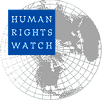 Source:
http://www.hrw.org/hrw/campaigns/kosovo98/index.htm
KOSOVO HUMAN RIGHTS FLASH #21
NATO URGED TO RESPECT HUMANITARIAN LAW
Inquiry into Aleksinac Bombing Demanded
(New York, April 7, 1999, 2:30pm EDT) — NATO forces are
required to respect international humanitarian law, the laws of
war, by minimizing damage to civilian areas and populations,
Human Rights Watch asserted today. The group called for an
immediate investigation into Monday's bombing of Aleksinac
village, which reportedly killed five civilians and injured fifty.
"The countries of the NATO alliance must take all steps to
minimize civilian casualties in times of war," said Holly Cartner,
Executive Director of Human Rights Watch's Europe and Central
Asia Division. "Warfare has its unintended tragic consequences.
But now the alliance must take visible and deliberate steps to
make sure that these are minimized. This includes holding
accountable those who might have made such a mortal mistake."
On Monday evening, three NATO missiles were reported to
have landed in a civilian neighborhood of Aleksinac, a village
about 100 miles south of Belgrade, killing five civilians. NATO
regretted the loss of life and called the incident an accident of
war. The intended target, NATO said, was a military barracks
positioned nearby.
International humanitarian law is the set of rules governing the
conduct of parties to international and internal armed conflicts. It
is comprised of the four Geneva Conventions of 1949 and their
protocols, which are binding on all states and belligerents.
The cornerstone of this body of law is the duty to protect the life,
health and safety of civilians and other non-combatants such as
soldiers who are wounded, captured, or who have laid down
their arms. It is absolutely prohibited to attack, injure or deport
such persons.
All warring parties -- in this case Serbian and Yugoslav forces,
the Kosovo Liberation Army, and the NATO alliance -- bear a
responsibility to take precautions, including doing everything
feasible to verify targets are not civilian objects, minimizing
incidental loss of civilian life, removing the civilian population from
the vicinity of military objectives, effectively warning the civilian
population in advance of attack unless circumstances do not
permit, and avoiding locating military objectives within or near
densely populated areas..It is forbidden at all times to direct
attacks against civilians or civilian objects (such as places of
worship, historic monuments, or hospitals). Parties to the conflict
may not use civilians to shield military objectives from attack.
Military objects are those that make an effective contribution to
military action; where there is doubt, the object shall be
presumed to be civilian.
A corollary to civilian immunity is a basic prohibition on
indiscriminate attacks. An attack is "indiscriminate" when its
effect cannot be limited and so harms military and civilian targets
without distinction. Indiscriminate attacks include those which
may be expected to cause incidental loss of civilian life, injury to
civilians, and/or damage to civilian objects which would be
excessive in relation to the concrete and direct military advantage
anticipated. Typical examples include tactics such as carpet
bombing populated areas which have military targets interspersed
or laying land mines that will kill both soldiers and civilians for
decades.
|


 Document compiled by Dr S D Stein
Document compiled by Dr S D Stein